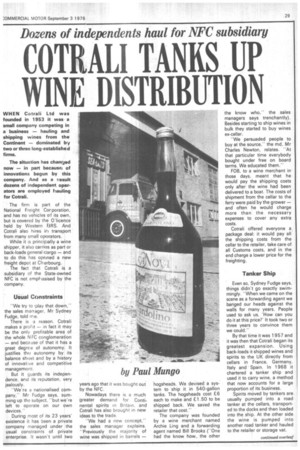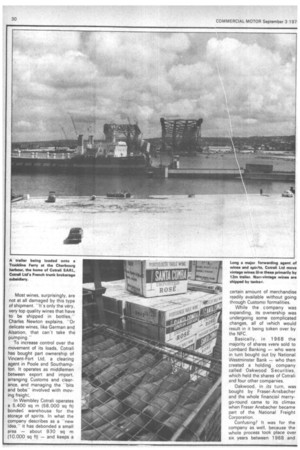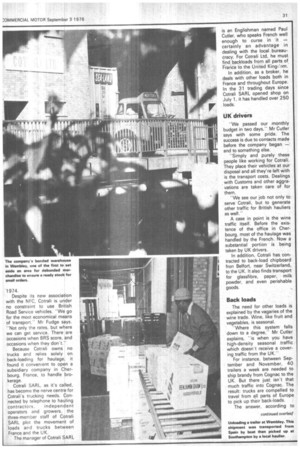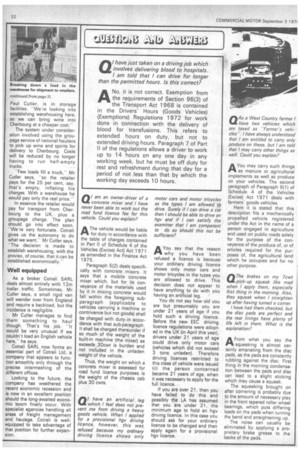Dozens of independents haul for NFC subsidiary
Page 31

Page 32

Page 33

Page 34

If you've noticed an error in this article please click here to report it so we can fix it.
COTRALI TANKS UP WINE DISTRIBUTION
by Paul Mungo
WHEN Cotrali Ltd was founded in 1953 it was a small company competing in a business — hauling and shipping wines from the Continent — dominated by two or three long-established firms.
The situation has chancied now — in part becauso of innovations begun by this company. And as a 'result dozens of independent, operators are employed funding for Cotrali.
• The firm is part of the National Freight Corporation, and has no vehicles of its own, but is covered by the O'licence held by Western F3RS. And Cotrali also hires iri transport from many small operators.
While it is principally a wine shipper, it also carries as part or back-loads general Cargo — and to do this has opcmed a new freight depot at Cherbourg.
The fact that Cotrali is a subsidiary of the State-owned NFC is not emphasised by the company.
Usual Constraints
"We try to play that down,'" the sales manager, Mr Sydney Fudge, told me.
There is .a reason, Cotrali makes a profit — in fact it may be the only profitable area of the whole N FC conglomeration — and because of that it has a great degree of autonomy. It justifies the autonomy by its balance sheet and by a history of innovafwe and competitive management.
But it guards its independence, arid its reputation, very jealously.
"We're a nationalised company," I1r Fudge says, summing up the subject, "but we're left to operate on our own devices."
During most of its 23 years' existence it has been a private company managed under the usual constraints of private enterprise. It wasn't until two years ago that it was bought out by the NFC.
Nowadays there is a much greater demand for Continental spirits in Britain, and Cotrali has also brought in new ideas to the trade.
"We had a new concept," the sales manager explains. "Previously the majority of wine was shipped in barrels — hogsheads. We devised a system to ship it in 540-gallon tanks. The hogsheads cost £6 each to make and £1.50 to be shipped back. We saved the retailer that cost."
The company was founded by a wine merchant named Archie Ling and a forwarding agent named Bill Brooks ("One had the know how,, the other the know who," the sales managers says trenchantly). Besides starting to ship wines in bulk they started to buy wines ex-cellar.
"We persuaded people to buy at the source," the md, Mr Charles Newton, relates. "At that particular time everybody bought under free on board terms. We educated them."
FOB, to a wine merchant in. those days, meant that he would pay the shipping costs only after the wine had been delivered to a boat. The costs of shipment from the cellar to the ferry were paid by the grower — and often he would charge more than the necessary expenses to cover any extra costs.
Cotrali offered everyone a package deal: it would pay all the shipping costs from the cellar to the retailer, take care of all Customs costs, and in the end charge a lower price for the freighting.
Tanker Ship Even so, Sydney Fudge says, things didn't go exactly swimmingly. "When we came on the scene as a forwarding agent we banged our heads against the walls for many years. People used to ask us, 'How can you do it at this price?' It took two or three years to convince them we could."
By that time it was 1957 and it was then that Cotrali began its greatest expansion. Using back-loads it shipped wines and spirits to the UK directly from cellars in France, Germany, Italy and ' Spain. In 1968 it chartered a tanker ship and used it to carry wine, a method that now accounts for a large proportion of its business.
Spirits moved by tankers are. usually pumped into a road tanker at the cellars, transported to the docks and then loaded into the ship. At the other side the wine •is pumped into another road tanker and hauled to the retailer or storage vat. Most wines, surprisingly, are not at all damaged by this type of shipment. "It's only the very, very top quality wines that have 'to be shipped in bottles," Charles Newton explains. "Or .delicate wines, like German and Alsation, that can't take the pumping."
To increase control over the movement of its loads, Cotrali has bought part ownership of Vincent-Fort Ltd, a clearing agent in Poole and Southampton. It operates as middlemen between export and import, arranging Customs and clearance, and managing the -bits and bobsinvolved with moving freight In Wembley Cotrali operates a 5,400 sq m (58,000 sq ft) bonded warehouse for the storage of spirits. In what the company describes as a "new idea,it has debonded a small area — about 930 sq m (10,000 sq ft) — and keeps a
certain amount of merchandise readily available without going through Customs formalities.
While the company was expanding, its ownership was undergoing some complicated changes, all of ‘Nhich would result in it being taken over by the NFC.
Basically, in 1968 the majority of shares vvere sold to Lombard Banking —• who were in turn bought out by National Westminster Bank —• who then created a holding company called Oakwood Securities, which held the shares of Cotrali and four other companies.
Oakwood, in its turn, was bought by Fraser-Ansbacher and the whole financial merrygo-round came to its; climax when Fraser Ansbacher became part of the National Freight Corporation.
Confusing? It was for the company as well, because the whole process took place over six years between 1968 and 1974.
Despite its new association with the NFC, Cotrali is under no constraint to use British Road Service vehicles. "We go for the most economical means of transport," Mr Fudge says.
Not only the rates, but where we can get service. There are occasions when BRS score, and occasions when they don't.'' Because Cotrali owns no trucks and relies solely on back-loading for haulage, it found it convenient to open a subsidiary company in Cherbourg, France, to handle brokerage.
Cotrali SARL, as it's called, has become the nerve centre for Cotrali's trucking needs. Connected by telephone to hauling contractors, independent operators and growers, the three-member staff of Cotrali SARL plot the movement of loads and trucks between France and the UK.
The manager of Cotrali SARL is an Englishman named Paul Cutler, who speaks French well enough to curse in it — certainly an advantage in dealing with the local bureaucracy. For Cotrali Ltd, he must find_backloads from all parts of France to the United Kingn.
In addition, as a broker, he deals with other loads both in France and throughout Europe. In the 31 trading days since Cotrali SARL opened shop on July 1, it has handled over 250 loads.
UK drivers
"We passed our monthly budget in two days," Mr Cutler says with some pride. The success is due to contacts made before the company began — and to something else.
"Simply and purely these people like working for Cotrali. They place their vehicles at our disposal and all they're left with is the transport costs. Dealings with Customs and other aggravations are taken care of for them.
"We see our job not only to serve Cotrali, but to generate other traffic for British hauliers as well."
A case in point is the wine traffic itself. Before the existence of the office in Cherbourg, most of the haulage was handled by the French. Now a substantial portion is being taken by UK drivers.
In addition, Cotrali has contracted to back-load chipboard Iron Belfort, near Switzerland, to the UK. It also finds transport for glassfibre, paper, milk powder, and even perishable goods.
Back loads
The need for other loads is explained by the vagaries of the wine trade. Wine, like fruit and vegetables, is seasonal.
"Where this system falls down to a degree," Mr Cutler explains, "is when you have high-density seasonal traffic which doesn't receive a covering traffic from the UK."
For instance, between September and November, 40 trailers a week are needed to ship brandy from Cognac to the UK. But there just isn't that much traffic into Cognac. The result: trucks are compelled to travel from all parts of Europe, to pick up their back-loads.
The answer, according to Paul Cutler, is in storage facilities. "We're looking into establishing warehousing here, so we can bring wine into Cherbourg at a cheaper cost."
The system under consideration involved using the groupage service of national hauliers to pick up wine and spirits for delivery to Cherbourg. Costs will be reduced by no longer having to run half-empty trucks. • "Few loads fill a truck," Mr Cutler says, "so the retailer pays for the 25 per cent, say, that's empty, inflating his charges. With a warehouse he would pay only the real price."
In essence the retailer would pay for transport from Cherbourg to the UK, plus a groupage charge. The plan should go into effect soon. "We're very fortunate. Cotrali gives us the autonomy to do what we want," Mr Cutler says. "The decision is made to establish warehousing, with the proviso, of course, that it can be established economically."
Well equipped
As a broker Cotrali SARL deals almost entirely with 12m trailer traffic. Sometimes, Mr Cutler says, a small rigid van will wander over from England and require a backload, but the incidence is negligible.
Mr Cutler manages to find them something to haul though. That's his job. "It would be very unusual if we couldn't load an .English vehicle here," he says, Cotrali SARL now forms an essential part of Cotrali Ltd, a company that appears to function smoothly only through the precise intermeshing of the different offices.
Looking to the future, the company has weathered the recent economic recession and is now in an excellent position should the long-awaited economic boom finally occur. With specialist agencies handling all areas of freight management and haulage, Cotrali is wellequipped to take advantage of that position for further expansion.




















































































